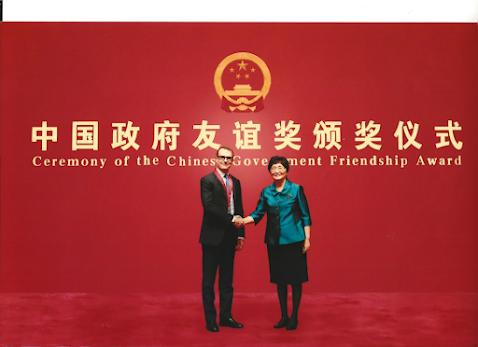Wetland protection should focus on "waste fishing gear", "illegal electrofishing" & "plastic pollution" | CBCGDF OceanWetlands Group Submitted 3 Recommendations on the "Regulations on Wetland Protection in Shandong Province (Draft)"
The Legal Affairs Working Committee of the Standing Committee of the Shandong Provincial People's Congress issued a notice of public consultation on the "Regulations on Wetland Protection in Shandong Province (Draft)" at the end of May 2024, the OceanWetlands Working Group of China Biodiversity Conservation and Green Development Foundation (CBCGDF) responded positively to the call, and after careful study, put forward 3 recommendations for its scientific decision-making.
Recommendation 1: It is recommended that the content of cleaning up the "used fishing gear" in the water body be included in the "Regulations on Wetland Protection in Shandong Province (Draft)".
At present, the whole text of the Draft lacks the content about cleaning up the "waste fishing gear" in the water body, which has to be said to be a significant regret and a blind spot of wetland management. As an important ecosystem, wetland not only undertakes the key functions of water resource regulation, pollutant degradation and biodiversity protection, but also serves as an important place for public recreation. However, the presence of used fishing gear poses a serious threat to the wetland environment and public safety.
Waste fishing gear, especially lost or discarded nets and fishing lines, often remain in the water and are difficult to degrade naturally, causing continuous pollution to the water ecosystem in the long term. These plastic products will gradually decompose into microplastics, which are misused by aquatic organisms and enter the food chain, negatively affecting the entire ecosystem. In addition, waste fishing gear can easily entangle aquatic animals, causing them to be injured or even die, seriously threatening biodiversity. Not only that, waste fishing gear also poses a direct threat to human safety. Swimmers, divers and tourists involved in aquatic activities can become entangled in fishing nets in the water, increasing the risk of drowning and even leading to fatal accidents. The recent drowning of a 17-year-old (trapped and drowned by a fishing net underwater) at Longhu Wetland Park in Magpie Mountain, Jinan, is a heartbreaking example that highlights the seriousness of this problem.
For more information:
Hidden dangers of rivers and lakes: "Ghost fishing gear" hides hidden killers, Shandong 17-year-old high school student drowned after being trapped in a fishing net during wild swimming! Can Jinan Longhu Wetland Park be exempted from responsibility?
https://mp.weixin.qq.com/s/erbDUryoXMXmaN6lBohbkQ
Ignoring the issue of "waste fishing gear" when formulating wetland protection regulations reflects the existence of a blind spot in the wetland management process. Comprehensive wetland protection regulations should cover all factors that may affect the environment and safety of wetlands, especially those issues that have been proven to pose a threat to ecology and human health. Therefore, it's suggested that the "Regulations on Wetland Protection in Shandong Province (Draft)" should be supplemented with relevant provisions that clearly stipulate the responsibilities and measures for the management & clean-up of waste fishing gear.
Recommendation 2: It is suggested that illegal electrofishing, poisoning and deep-frying of fish should be explicitly prohibited.
(1) It is recommended that a prohibition clause specifically targeting illegal electrofishing, poisoning and deep-frying be added to Article 30, for example, prohibiting the use of electrofishing, poisoning and deep-frying by any unit or individual, and cracking down on illegal electrofishing, poisoning and deep-frying behaviour.
(2) It is proposed to add the following contents in Chapter V Supervision and Guarantee: Increase the penalties for illegal electrofishing, poisoning and deep-frying, and raise the cost of violation of the law. Establish and improve the coordination mechanism for wetland law enforcement, strengthen joint law enforcement, and form a strong synergy to crack down on illegal electrofishing, fish poisoning and fish frying. Improve the mechanism of connecting wetland protection law enforcement and criminal justice, and pursue criminal responsibility for serious cases according to law.
(3) It is suggested that the following be added to Article 9: Rewards shall be given to those who have meritorious experience in reporting illegal electrofishing, fish-poisoning , and using torpedoes to blow up fish in the river. Encourage and support social organisations and volunteers to participate in wetland protection activities.
Recommendation 3: There is no mention of "plastic pollution" in the full text of the "Regulations on Wetland Protection in Shandong Province (Draft)" , so it is suggested to add relevant contents.
It's suggested the content about such things as be included: To prohibit the abandonment of disposable plastic products within the wetland, causing plastic pollution. Strengthen the supervision of catering, entertainment, tourism and other industries around the wetland, and urge operators to implement measures to limit plastic. Regularly organise the clean-up of plastic rubbish around the wetland and in the water body, and establish a long-term management mechanism. Acts of illegal discharge and dumping of plastic waste in wetlands will be severely punished in accordance with the law.
(This article is a record of daily work, for reference ONLY.)
Compiled by: Samantha
Contact: v10@cbcgdf.org; +8617319454776
Contribution
Do you know? We rely on crowd-funding and donations. You have the opportunity to help an international movement to advance biodiversity conservation. Donate TODAY to power up the movement to make it a better world for all life.
Donation(501C3)Paypal: intl@wbag.org
https://www.paypal.com/donate/?hosted_button_id=2EYYJJZ8CGPL






.jpg)



Comments
Post a Comment